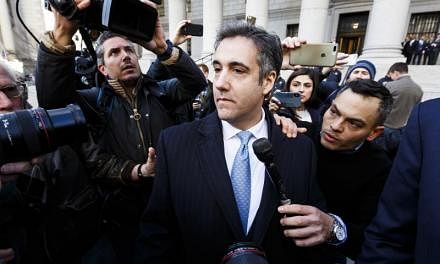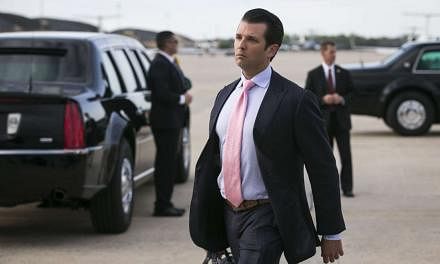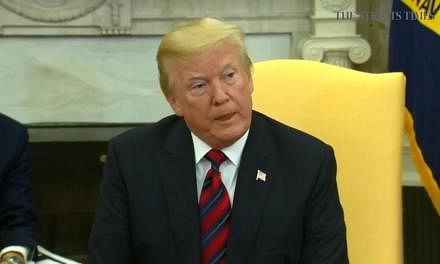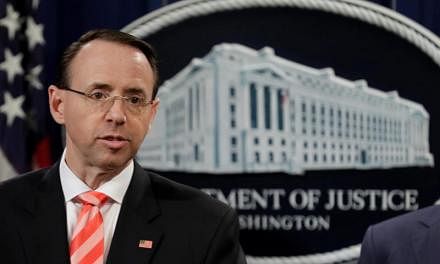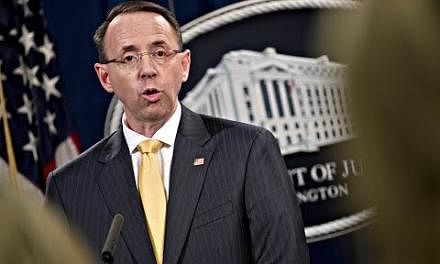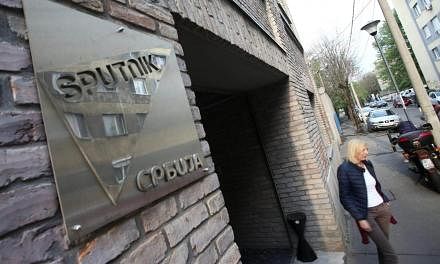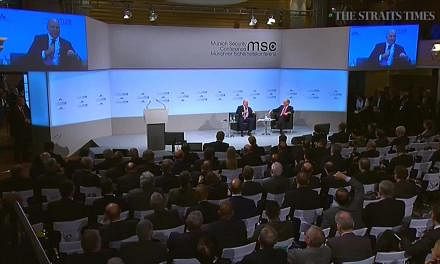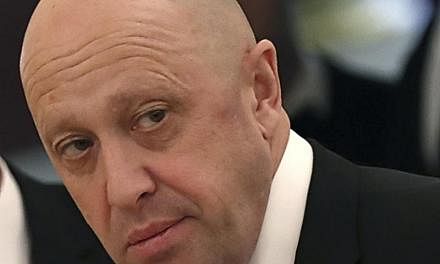WASHINGTON - The elaborate detail in a 37-page indictment by the Federal Bureau of Investigation (FBI) of Russian individuals and organisations accused of an elaborate, long-running, well-funded operation to disrupt and distort America's election process, has stunned Washington's political circles.
The indictment brings home the reality - until now challenged and dismissed by US President Donald Trump as a hoax perpetuated by the Democratic Party - of the sophistication of the Russian establishment's attempts to erode the credibility of America's democratic system.
The operation involving 13 Russians, several Russian organisations, shell companies, money transfers and stolen and invented identities, spanned the online social media ecosystem as well as ground operations including mobilising Americans for protests. The tactical target was, among others, Mr Trump's challenger Hillary Clinton.
Warnings of this surfaced from the US intelligence community before the November 2016 election that swept Mr Trump to power.
The objective was to sow doubt and discord, and undermine the faith of the American people in the political system; and secondly to hurt Mrs Clinton and thirdly, help Mr Trump, former Director of National Intelligence James Clapper told CNN.
Mr Clapper, before his resignation from the position in January 2017, was among those in the intelligence community who had briefed Mr Trump.
But the allegations were perceived by the President as an attempt to erode the credibility of his election win.
During his trip to Asia in November, Mr Trump said Russian President Vladimir Putin had told him that Russia did not meddle in the US election.
"Every time he sees me he says, 'I didn't do that,' and I really believe that when he tells me that, he means it," Mr Trump told reporters. "I think he is very insulted by it...which is not a good thing for our country."
On Friday (Feb 16), soon after the indictment was announced, Mr Trump claimed the investigation had uncovered no evidence of collusion between the Trump campaign and Russia.
"It's time we stop the outlandish partisan attacks, wild and false allegations, and far-fetched theories, which only serve to further the agendas of bad actors, like Russia, and do nothing to protect the principles of our institutions," he said in a statement.
In a tweet, he did however tacitly admit to the interference - but in the context of his own campaign.
"Russia started their anti-US campaign in 2014, long before I announced that I would run for President," he wrote. "The results of the election were not impacted. The Trump campaign did nothing wrong - no collusion!"
The indictment does specify that the agents of the Russian operation were in touch with three unnamed members of the Trump campaign, but that no American knowingly colluded with the operation.
"I was pleased to see the special counsel called us unwitting, because we were," Ms Susie Wiles, who ran Mr Trump's presidential campaign in Florida in September 2016, told the Wall Street Journal.
But Mr Trump's triumphal tone does not fully consider other components of the investigation led by Special Counsel Robert Mueller, analysts say.
Mr Mueller's investigation will steam on. The Special Counsel's team has in recent days questioned Mr Steve Bannon, Mr Trump's former chief strategist. The probe will still dig into the question of potential collusion. And whether or not there was collusion - unwitting or witting - it will also consider whether there was obstruction of justice, an allegation triggered by the President's firing of former FBI chief James Comey last year.
"When you have an investigation that unfolds piecemeal, trying to seize on a particular document to say it exonerates seems a misunderstanding, willful or not, of the process," Dr Glenn Altschuler, Professor of American Studies at Cornell University told The Straits Times.
"We simply do not know whether this will be followed by more information."
"This is a point on an evolving process. It has already had an impact; we've had the clearest admission from the President to date that there was a campaign by the Russians to interfere with the elections. This makes it more difficult to characterise Russian meddling as a Democratic Party hoax and witch hunt."
Mr Clapper told CNN : "There are other shoes to drop here, I think there's much more to come."
But concern over Russia's meddling should be greater than the President, the former national security advisor added.
"The collusion is significant if it is proven but what's a greater danger to the country is the lack of response to this; we do not have a whole of government approach to defending ourselves against further such attacks," Mr Clapper said.
On Tuesday, in an open session of the Senate committee's annual Worldwide Threat Assessment hearing, Mr Clapper's successor, Director of National Intelligence Dan Coats said: "We need to inform the American public that this is real."
He called for "resilience...for us to stand up and say we're not going to allow some Russian to tell us how to vote, how to run our country," he said. "I think there needs to be a national cry for that."
The US sees Russia under Mr Putin as a revisionist power and along with China, a major strategic competitor to the United States. Mr Putin seized Crimea - a part of Ukraine - in 2014.
Separately in an e-mail to The Straits Times, Dr Patrick Cronin, of the Centre for a New American Security (CNAS) wrote: "(Vladimir) Putin was determined to wreak havoc with American democracy after we imposed sanctions for invading the Crimea."
"He instructed his intelligence services to launch cyber warfare on our open institutions," Dr Cronin wrote. "We have known this since the summer of 2016 but now the indictments (have) let the world know some of the operatives Putin relied upon."
"The United States will defend its free and open institutions from the growing threat of cyber attack and information warfare," he wrote.


